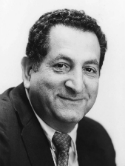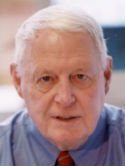Characterization of potent inhibitors of the Bcr-Abl and the c-kit receptor tyrosine kinases Journal Article
| Authors: | Wisniewski, D.; Lambek, C. L.; Liu, C.; Strife, A.; Veach, D. R.; Nagar, B.; Young, M. A.; Schindler, T.; Bornmann, W. G.; Bertino, J. R.; Kuriyan, J.; Clarkson, B. |
| Article Title: | Characterization of potent inhibitors of the Bcr-Abl and the c-kit receptor tyrosine kinases |
| Abstract: | The early stage of chronic myelogenous leukemia (CML) is caused by the tyrosine kinase Bcr-Abl. Imatinib mesylate (also known as STI-571 and Gleevec), a tyrosine kinase inhibitor, has shown encouraging results in CML clinical trials and has become a paradigm for targeted cancer therapeutics. Recent reports of resistance to imatinib argue for further development of therapies for CML. During studies of signal transduction, we observed that the pyrido[2,3-d]pyrimidine src tyrosine kinase inhibitor PD173955 inhibited Bcr-Abl-dependent cell growth. Subsequently, a related compound, PD180970, was reported as a potent inhibitor of Bcr-Abl. We have compared the potency of these two compounds and four other analogues with imatinib on Bcr-Abl-dependent cell growth, cytokine-dependent cell growth, and tyrosine kinase inhibition. PD173955 inhibited Bcr-Abl-dependent cell growth with an IC50 of 2-35 nM in different cell lines. Fluorescence-activated cell-sorting analyses of cells treated with PD173955 showed cell cycle arrest in GI. PD173955 has an IC50 of 1-2 nM in kinase inhibition assays of Bcr-Abl, and in cellular growth assays it inhibits Bcr-Abl-dependent substrate tyrosine phosphorylation. Of the six pyrido[2,3-d]pyrimidine analogues studied, PD166326 was the most potent inhibitor of Bcr-Abl-dependent cell growth. PD173955 inhibited kit ligand-dependent c-kit autophosphorylation (IC50 = ∼25 nM) and kit ligand-dependent proliferation of M07e cells (IC50 = 40 nM) but had a lesser effect on interleukin 3-dependent (IC50 = 250 nM) or granulocyte macrophage colony-stimulating factor (IC50 = 1 μM)-dependent cell growth. These compounds are potent inhibitors of both the Bcr-Abl and c-kit receptor tyrosine kinases and deserve further study as potential treatments for both CML and for diseases in which c-kit has a role. |
| Keywords: | controlled study; unclassified drug; human cell; cell division; imatinib; stem cell factor receptor; proto-oncogene proteins c-kit; drug potency; drug structure; 6 (2,6 dichlorophenyl) 2 [3 (hydroxymethyl)anilino] 8 methylpyrido[2,3 d]pyrimidin 7(8h) one; protein tyrosine kinase; chronic myeloid leukemia; pyridones; pyrimidines; structure-activity relationship; phosphorylation; protein tyrosine kinase inhibitor; cancer inhibition; drug mechanism; enzyme inhibitors; hematopoietic stem cells; models, molecular; protein-tyrosine kinases; bcr abl protein; receptor protein-tyrosine kinases; ic 50; g1 phase; 6 (2,6 dichlorophenyl) 2 (4 fluoro 3 methylanilino) 8 methyl 8h pyrido[2,3 d]pyrimidin 7 one; 6 (2,6 dichlorophenyl) 8 methyl 2 (3 methylthioanilino) 8h pyrido[2,3 d]pyrimidin 7 one; pd 173952; pd 173956; pd 173958; tumor stem cells; leukemia, myeloid, chronic; pyrido[2,3 d]pyrimidine derivative; humans; human; priority journal; article; 6 (2,6 dichlorophenyl) 2 (4 ethoxyphenylamino) 8 methyl 8h pyrido[2,3 d]pyrimidin 7 one; 6 (2,6 dichlorophenyl) 2 (4 fluorophenylamino) 8 methyl 8h pyrido[2,3 d]pyrimidin 7 one; 6 (2,6 dichlorophenyl) 8 methyl 2 (4 morpholin 4 ylphenylamino) 8h pyrido[2,3 d]pyrimidin 7 one |
| Journal Title: | Cancer Research |
| Volume: | 62 |
| Issue: | 15 |
| ISSN: | 0008-5472 |
| Publisher: | American Association for Cancer Research |
| Date Published: | 2002-08-01 |
| Start Page: | 4244 |
| End Page: | 4255 |
| Language: | English |
| PUBMED: | 12154026 |
| PROVIDER: | scopus |
| DOI/URL: | |
| Notes: | Export Date: 14 November 2014 -- Source: Scopus |
Citation Impact
MSK Authors
Related MSK Work






